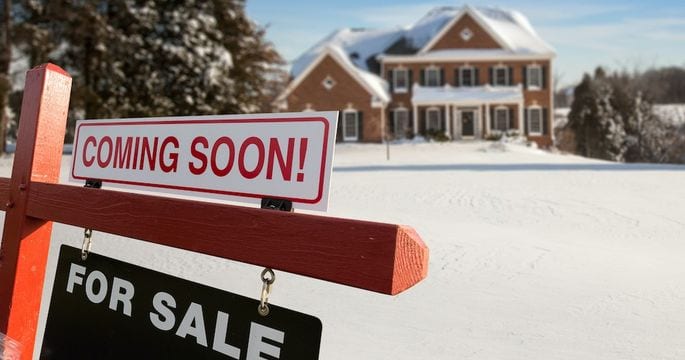Why This Winter’s ‘Slow’ Home-Selling Season May Be Hotter Than Ever
By Erica Sweeney | Nov 2, 2020
Winter is traditionally real estate’s slow season. Between the cold weather and the holidays, the housing market typically plunges into a hibernation of sorts, with both buyers and sellers shelving any major real estate moves until spring.
This winter’s real estate market, however, is shaping up to be unlike any other before it—and, contrary to what some may have feared, is slated to be an excellent time to sell a home. In fact, Lawrence Yun, chief economist at the National Association of Realtors, predicts “it will be one of the best winter sales years ever.”
Why? Chalk it up to a perfect storm of low mortgage interest rates, sparse housing inventory, plus a pandemic that’s fundamentally changed how, when, and where buyers are shopping for homes.
So if you’ve assumed you should put your home-selling plans on hold until spring, read on for a surprising reality check on all the reasons this winter could be a great time to put your house on the market.
Pandemic lockdowns have created pent-up buyer demand
While spring is typically real estate’s busy season, the “silent spring” of 2020 saw the housing market grind to a near halt amid pandemic-mandated lockdowns. This, in turn, created pent-up demand to purchase property that is only now being unleashed.Top of FormGet Pre-Approved
Find a lender who can offer competitive mortgage rates and help you with pre-approval.
Bottom of Form
“We currently see buyers sticking around in the housing market much later than we usually do this fall,” says Danielle Hale, chief economist at realtor.com®. “If that trend continues, we will see more buyers in the market this winter, too. So this winter is likely to be a good time to sell.”
“There are plenty of people in the pipeline ready to hit the market this late autumn and winter,” Yun agrees.
Many real estate agents have noticed this glut of eager buyers first-hand.
“Winter is usually a slower season, but this year we’re not seeing any sign of letting up,” says Matt van Winkle, a real estate broker and owner of Re/Max Northwest Realtors in Seattle. “The selling season was delayed because of COVID lockdowns and stay-at-home orders, so several months of usual busy sales periods were delayed.”
This buyer demand likely won’t wane anytime soon.
“We will see an extended purchase season in 2020 and into 2021,” says Shelby McDaniels, channel director of corporate home lending at Chase.
Lockdowns are forcing many buyers to upsize their homes
COVID-19 has not only created pent-up demand, but many buyers are also in the market purely because they’re working/schooling from home and realizing their space is no longer big enough—particularly now that the temperature’s dropping so they can’t easily escape to their back patio to catch up on emails alone.
“With people spending so much time in their homes, including working from home and virtual schooling, there’s a great emphasis on being happy there,” says Matt Curtis, owner of Matt Curtis Real Estate, in Huntsville, AL. Lack of space is a complaint agents hear more often now.
And if people are allowed to continue working from home rather than commuting to an office, they might also realize that they can shop for homes farther outside cities—great news for home sellers who live in more remote areas.
02:18
02:18
Housing inventory is low
Although buyers are plentiful, the number of homes for sale is way lowerthan usual. According to realtor.com’s Monthly Housing Market Trends Report, in September, national housing inventory declined 39% over last year.
“Because the number of homes available is currently at a record low, even if we see some improvement, which I expect, there will still be relatively few homes for sale,” Hale says. “That will keep upward pressure on home prices and help ensure that homes continue to sell quickly.”
“Inventory is low, so the overall advantage is with the seller,” agrees Yun.
Tracy Jones, a real estate agent with Re/Max Platinum Realty in Sarasota, FL, says buyers have so few homes to choose from these days that they’re feeling forced to make quick decisions about whether to make an offer, or risk losing out on the chance. Nationally, homes spent an average of 54 days on the market in September, 12 fewer days than last year, according to the realtor.com trends report.
“The buyers I have worked with this year only had a handful of homes to look at,” Jones says. “They had no time to wait and talk about it, and they had to fight other buyers if they wanted to buy them.”
Sellers can get top dollar for their homes
It’s simple supply and demand: Low supply and high demand are bound to drive up home prices, so sellers stand to make a killing.
Across the country, median home listing prices jumped 11.1% in September compared with a year ago, to $350,000, according to realtor.com. Price per square foot increased by 13.9%.
“Sales prices and home values remain strong,” McDaniels says. And since there are so many offers on the table, “sellers can call the shots regarding terms of contract and repairs.”
The only challenge sellers face with such low inventory—if you can even call it a challenge—is dealing with too many offers at once, says Curtis.
“The challenge they face is navigating multiple offers and not accepting an offer too quickly to help ensure they get the most money for their home,” he says.
Mortgage interest rates are low
Although buyers will face stiff competition, it’s not all bad news for them. For one, despite high home prices, record-low interest rates mean they’ll save a ton of money.
Interest rates on a 30-year fixed-rate loan were 2.8% as of Oct. 22, according to Freddie Mac.
This “boosts buyer home purchasing power,” Hale says. “In fact, despite double-digit increases in home prices this year compared to last year, today’s home buyers are likely actually paying slightly less on their mortgage each month, thanks to much lower mortgage rates.”
The Federal Reserve has continued to lower interest rates this year to keep the economy going during the COVID-19 crisis, says McDaniels.
“Even before the COVID-19 pandemic, economists and real estate professionals predicted mortgage interest rates would remain below 4% in 2020,” she says. “This means buyers that might have waited will consider entering the market this year.”
Any economic shift likely won’t be felt until spring
Although unemployment continues to rise due to COVID-19 layoffs, Hale says this could affect the real estate market, but the effects likely won’t be felt for a few months.
“A worsening unemployment rate would lead to a slowdown in the housing market and home sales, but I don’t expect that to happen immediately, more likely in the spring,” Hale says. This could create a slower start to the spring home-buying season.
Plus, if another round of stimulus money appears, this would fuel consumer spending.
“This would be a good thing for the housing market and the economy at large,” Hale says.
Any Questions?
Please feel free to call me with any real estate questions. I’d love to help guide you with buying or selling. MelissaStevenson.com 309-256-0649

